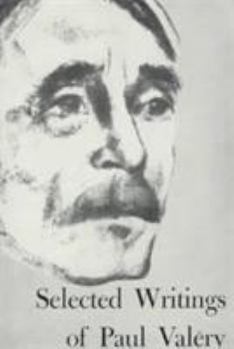Selected Writings of Paul Valery
Select Format
Select Condition 
Book Overview
It begins with the poetry (French and English en face), including such masterpieces as "Le Cimetiere Marin" and portions of "La Jeune Parque"; then ranges through Val ry's work in fields as various as architecture, logic, the dance, literature, philosophy, and painting. It concludes with excerpts from his creative writings such as Monsieur Teste and the drama Mon Faust.
The list of translators for this volume is distinguished. Among them are...
Format:Paperback
Language:English
ISBN:0811202135
ISBN13:9780811202138
Release Date:January 1964
Publisher:New Directions Publishing Corporation
Length:256 Pages
Weight:0.62 lbs.
Dimensions:0.8" x 5.3" x 8.0"
Customer Reviews
3 ratings
His mind was his material and his method
Published by Thriftbooks.com User , 18 years ago
This volume consists in selections of Paul Valery's writings. Valery was a thinker and poet whose own intellectual path was a unique one. He began by writing poetry but then in his early twenties decided to abandon poetry completely in order to devote himself to the study of his own mind, the study of his own creative process. And so he began that lifework of every morning sitting down and writing down his observations, his thoughts about his creative process. Early on he had the hope that this will lead him to something like a mathematically complete system of understanding of the mind. Later on, his ambitions became more modest. After twenty years of poetic silence he at the urging of others resumed writing poetry and wrote among other things 'La Jeune Parque' which is in this volume. This work made him famous , something he regarded as a very mixed blessing. But the fame enabled him to find new ways of making a living when his work for the Defense Department of France, terminated. This present volume contains 'Le Cimitiere Marin' 'Le Jeune Parque' excerpts from 'Monsieur Teste ' and the drama 'Mon Faust'. In the essays one feels Valery's unique and great aphoristic powers, powers which are felt even more strongly in his Notebooks. Valery is a concise, precise, thought- provoking writer. He is an intellectual figure of great integrity and singular determination. He is also inspiring. Reading these words of his many years ago I too felt myself' thinking in aphorisms'. I conclude here with a section from Joseph Epstein's outstanding review of the English translated edition (in five volumes) of Valery's 'Notebooks'. "Rilke once remarked that what drew him to Paul Valéry's writing was the "finality" and "composure" of its language. His lucidity on complex subjects is what excites; his ability to capture the essence of the questions, issues, and problems that the rest of us find puzzling if not impenetrable is what amazes-and that he was able to do so with an almost assembly-line regularity is itself astonishing. " What gives Valéry's prose its gravity, lucidity, and chasteness is what he excludes from it. He disliked irony, except in conversation, and felt that it chiefly gave a writer an air of superiority, adding that "every ironist has in mind a pretentious reader, mirror of himself." He also had a distaste for eloquence, "because eloquence has the form of a mixture, adapted to a crowd. It has not the form of thought." He cared more for precision than profundity, and precision was only accessible through the utmost clarity: "the kind that does not come from the use of words like `death,' `God,' `life,' or `love'-but dispenses with such trombones." No trombones, no trumpets, no brass section in Valéry's prose; a solo cello, deep strings played under perfect control and superior acoustical conditions, is all we ever hear."
GREAT BOOK
Published by Thriftbooks.com User , 19 years ago
I'm very glad I discovered Paul Valery. He is a source of enlightened wisdom equal to any Zen master. While I suspect that some of the translations (the book contains multiple translators of multiple items) may be a bit ponderous, if you have patience you will find incredible wisdom in this GREAT BOOK. Valery wrote from the point of view of the absolute center of consciousness...tempered by the experience of mortality.
Symbolist brilliance
Published by Thriftbooks.com User , 24 years ago
When Valery was writing, the Symbolist movement had already died down, but he was nonetheless accurate in defining, describing, and practicing it. The essays contained in this edition are exquisite. The prose is probably the closest thing to Pater you'll find in French--despite Symons' declaration that the brothers Goncourt were the French Paterians, I found more of that in Valery than in the Goncourts. The poetry is also interesting, although to a lesser extent.





